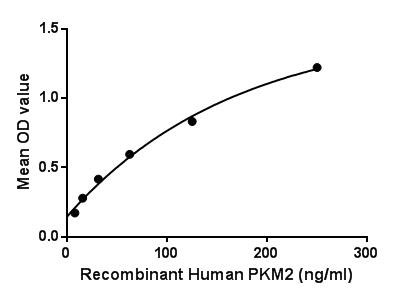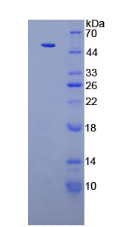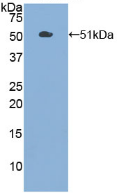
Details
ACTIVITY TEST
Buffer Formulation 20mM Tris, 150mM NaCl, pH8.0, containing 1mM EDTA, 1mM DTT, 0.01% SKL, 5% Trehalose and Proclin300. Traits Freeze-dried powder Purity > 97% Isoelectric Point 8.3 Applications Cell culture; Activity Assays.

Figure. The binding activity of PKM2 with PIN1.
Pyruvate Kinase, Muscle (PKM2) is one of four isozymes of pyruvate kinase. In vertebrates there are four isozymes of pyruvate kinase: L (liver), R (erythrocytes), M1 (muscles, hearts and brain) and M2 (only form detectable in early fetal tissue and present in most adult tissues). Pyruvate kinase is the enzyme that catalyzes the final step of glycolysis. It catalyzes the transfer of a phosphate group from phosphoenolpyruvate (PEP) to adenosine diphosphate (ADP), yielding one molecule of pyruvate and one molecule of ATP. Besides, Peptidyl Prolyl Cis/Trans Isomerase NIMA Interacting Protein 1 (PIN1) has been identified as an interactor of PKM2, thus a binding ELISA assay was conducted to detect the interaction of recombinant human PKM2 and recombinant human PIN1. Briefly, PKM2 were diluted serially in PBS, with 0.01% BSA (pH 7.4). Duplicate samples of 100µL were then transferred to PIN1-coated microtiter wells and incubated for 2h at 37℃. Wells were washed with PBST and incubated for 1h with anti-PKM2 pAb, then aspirated and washed 3 times. After incubation with HRP labelled secondary antibody, wells were aspirated and washed 3 times. With the addition of substrate solution, wells were incubated 15-25 minutes at 37℃. Finally, add 50µL stop solution to the wells and read at 450nm immediately. The binding activity of PKM2 and PIN1 was shown in Figure 1, and this effect was in a dose dependent manner.USAGE
Reconstitute in 20mM Tris, 150mM NaCl (pH8.0) to a concentration of 0.1-1.0 mg/mL. Do not vortex.
STORAGE
Avoid repeated freeze/thaw cycles. Store at 2-8°C for one month. Aliquot and store at -80°C for 12 months.
STABILITY
The thermal stability is described by the loss rate. The loss rate was determined by accelerated thermal degradation test, that is, incubate the protein at 37°C for 48h, and no obvious degradation and precipitation were observed. The loss rate is less than 5% within the expiration date under appropriate storage condition.
Image

Figure. SDS-PAGE

Figure. Western Blot
Partial purchase records(bought amounts latest0)
User Comment(Total0User Comment Num)
- No comment


 +86 571 56623320
+86 571 56623320




